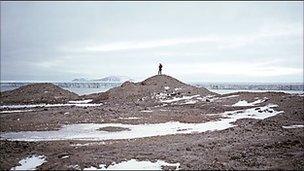Ilfracombe students in Olympic arts project
- Published

Alex Hartley standing on Nowhereisland which he found on a climate change expedition in 2004
Two students from Ilfracombe Arts College have flown to the Arctic to join an Olympics arts project.
Lydia Maloney, 18, and Charlie Logan, 17, will be on the Svalbard archipelago north of Norway for two weeks.
They will help to create a floating island from land and soil uncovered by a retreating glacier.
Next year "Nowhereisland" will be towed around South West as part of London's 2012 Cultural Olympiad.
'Groundbreaking art'
It is one of 12 arts projects chosen nationally to represent each of the UK regions as part of the Cultural Olympiad to run alongside the sporting events in 2012.
The island will be in Weymouth for the Olympic sailing.
Artist Alex Hartley found the unnamed island on a climate change expedition in 2004.
People will be invited to become citizens of Nowhereisland, although no-one will be allowed on it except Mr Hartley.
The Arts Council-funded project - commissioned by the organisation Situations, based at the University of the West of England - is designed to get people talking about what makes a nation.
The Ilfracombe college has been working with Mr Hartley since the project got the go-ahead in 2009.
Lydia Maloney and Charlie Logan said as well as helping to create the island, their work will include making blogs, featuring photos and video footage, so people in Britain and their fellow students could see the expedition's progress.
Charlie said: "Although the trip will be unforgettable, in summer 2012 the island will be stopping at Ilfracombe harbour and it will be such a good chance for the town to get involved in the project.
"It's a great opportunity for people to see Ilfracombe in a new light by being involved in such a ground-breaking public art project."
Polar bear precautions
The expedition is to the Svalbard archipelago, where a British teenager was killed and four people where injured during an attack by a polar bear in August near a glacier on the Norwegian island of Spitsbergen.
The group of 13 from the British Schools Exploring Society were asleep in their tents when the bear attacked.
However, Situations said the expedition members would not be spending any nights off the Noorderlicht, the ship they were travelling on.
The ship's crew and the expedition team leader were trained in how to deal with polar bear encounters, it added.
Situations said: "The Noorderlicht crew will always undertake a full search of any landmass before deeming it safe for the expedition team to disembark from the vessel and will then remain on guard with flares and a fully-loaded rifle until all the expedition team returns to the vessel safely."